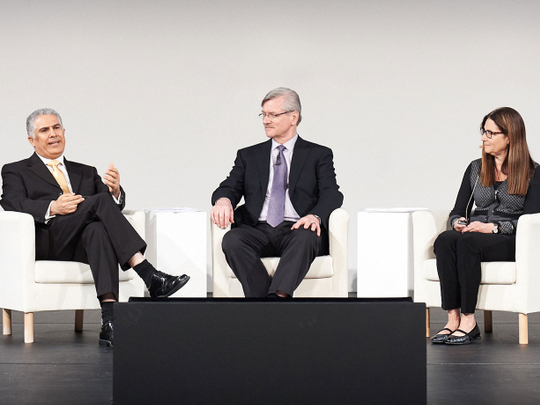
Abu Dhabi: Children as young as three years can also be victims of bullying, according to childhood development experts visiting the UAE.
Dr Ron Slaby, senior scientist at the Children’s Hospital Boston Harvard Medical School in the US delivered a talk in the capital and emphasised the importance of awareness of this relatively unknown, but common, occurrence.
Dr Kim Storey, a US-based child education specialist, who was also at the talk, urged parents to be vigilant and take note of signs of distress in their children — even at a very young age — as a result of being bullied.
The talk was organised by Salama Bint Hamdan Al Nahyan Foundation, a philanthropic organisation.
“It is therefore necessary to equip children with the skills to protect themselves from bullying behaviour, and these skills are most effective when practised from a young age, Dr Slaby said. “Parents and caregivers also need to know to look out for hurtful actions and stop these in a constructive manner,” he added.
Bullying, defined as an abuse of power, can result in the bully becoming aggressive and often engaging in violent and even criminal behaviour in the long run. At the same time, the victim of bullying can develop depression and low self-confidence. Bystanders, too, can experience feelings of guilt, the visiting experts said.
As reported by Gulf News in November 2014, surveys conducted by the emirates education sector regulator, the Abu Dhabi Education Council (Adec), indicated that 60 per cent of teenage boys had been bullied one or more times during the academic year.
“Instances of bullying are often ignored at a young age, especially as parents and teachers find it hard to believe that it can start so early. They simply dismiss it as a child having a bad day or being a problem child,” Dr Slaby said.
Dr Slaby recommended that parents and caregivers teach children how to stand up to bullies. “Bullies also need to be taught empathy. We tell caregivers to teach children the golden rule of treating others in the same way that they would want to be treated, and avoid doing what they would not want done to themselves,” Dr Slaby said.
“A mean word or a child whispering secrets to a child while ignoring another can be instances of bullying. Children need to be coached to say ‘what you are doing is hurtful’ calmly when they feel victimised in such a manner,” Dr Storey said.
She also advised that victims stand straight, look bullies in the eye and use simple phrases to ask the bully to stop [their hurtful behaviour].
Children can also be taught to intervene constructively when they see others being bullied, Dr Storey added.
“Teach children what to do when they see another child being hurt. For example, they can say, “Please stop that. It’s not nice.” Or they can ask the victim to come play with them in order to take them away from the bully,” Dr Storey advised.












